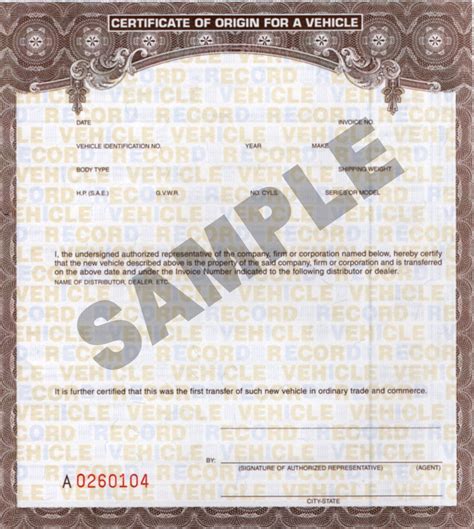What is a Certificate of Origin for a Vehicle and How to Obtain One?
A Certificate of Origin (COO) for a vehicle is a vital document proving the country where the vehicle was manufactured. Unlike a title, which proves ownership, the COO confirms the vehicle's place of origin. This document is crucial for various reasons, particularly when importing or exporting vehicles internationally or dealing with customs regulations. Understanding its importance and how to obtain one is key for anyone involved in the international vehicle trade.
Why is a Vehicle's Certificate of Origin Necessary?
Several scenarios necessitate a vehicle's COO:
-
International Trade: When importing or exporting a vehicle, customs authorities require the COO to verify its origin and ensure compliance with import/export regulations and tariffs. This helps prevent the entry of counterfeit or illegally manufactured vehicles.
-
Verification of Authenticity: The COO helps authenticate the vehicle's manufacturing details, combating fraud and the import of stolen or illegally modified vehicles.
-
Legal Compliance: Many countries have strict regulations regarding imported vehicles. The COO ensures compliance with these regulations, avoiding legal issues and potential penalties.
-
Insurance Purposes: Some insurance companies might require a COO as part of their documentation process, especially for vehicles imported from outside the country.
-
Resolving Disputes: In case of any disputes related to the vehicle's origin or authenticity, the COO serves as crucial evidence.
How to Obtain a Certificate of Origin for a Vehicle
The process of obtaining a COO varies depending on the vehicle's manufacturer and the country of origin. However, some general steps are typically involved:
1. Identify the Relevant Issuing Authority: This is usually the manufacturer or an authorized representative of the manufacturer in the country of origin. For older vehicles, finding the correct authority might require more research. You may need to contact the manufacturer directly or search for relevant government agencies related to vehicle registration or exports.
2. Gather Necessary Documentation: The required documents vary but often include:
- Proof of Ownership: This could be a title or other documentation proving ownership of the vehicle.
- Vehicle Identification Number (VIN): The VIN is a unique identifier for the vehicle and is crucial for verification.
- Manufacturer's Data Plate Information: This plate often includes details like the manufacturing date, model, and engine information.
- Bill of Sale (if applicable): If the vehicle was recently purchased, a bill of sale may be necessary.
- Completed Application Form: The issuing authority will provide the necessary application forms.
3. Submit the Application and Supporting Documents: Once you have gathered the necessary documents, you submit the application and documents to the issuing authority. You may need to pay a fee for processing the application.
4. Processing Time: The processing time for a COO varies depending on the issuing authority and the volume of applications they handle. It could range from a few days to several weeks.
5. Receipt of the COO: Once the application is processed and approved, the issuing authority will issue the COO. This document is usually official and tamper-proof.
Frequently Asked Questions
What is the difference between a Certificate of Origin and a title?
A title proves ownership of the vehicle within a specific jurisdiction. A Certificate of Origin proves the vehicle's country of manufacture and is primarily used for international trade and customs purposes. They serve different legal purposes.
Can I obtain a Certificate of Origin for a used vehicle?
Yes, obtaining a COO for a used vehicle is possible, but it might be more challenging than for a new vehicle. You will likely need to provide more documentation to prove the vehicle's origin and ownership history. Contacting the manufacturer or a specialized vehicle import/export agency may be helpful.
How long is a Certificate of Origin valid for?
The validity period for a COO isn't standardized across all countries. It's usually valid until the vehicle is officially registered in the importing country, or it might have a specified validity period, depending on the issuing authority. It is crucial to check with the specific issuing authority for the validity period.
What happens if I don't have a Certificate of Origin when importing a vehicle?
Importing a vehicle without a COO can result in significant delays, penalties, and even the rejection of the import by customs authorities. Obtaining the COO beforehand is crucial to avoid such complications.
Obtaining a Certificate of Origin might seem complex, but understanding the process and gathering the necessary documents beforehand will significantly smooth the procedure. Remember to always check with the relevant authorities in the countries involved in the vehicle's import or export to ensure compliance with all regulations. Consulting with an international shipping or customs broker can also be beneficial, especially for complex international transactions.

